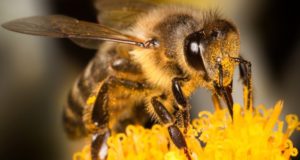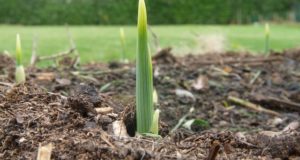If you have outdoor or barn cats—and if you are a homesteader you probably do—you know that they can be a boon and a nuisance. Cats have been hanging out on and around farms for millennia, since they first became domesticated. The relationship between you and your cats is a symbiotic one. You provide them with food, water, shelter, and veterinarian care, and they keep rodents and other pests out of your feed and food.
Outdoor cats can be pests themselves, however. Feral cats, those who have returned to the wild and rely on humans only minimally if at all, are notorious for killing songbirds, frogs, and other animals that are not considered to be pests. Your barn cats may be responsible for this as well.
 Another problem arises if you have a garden. Cats love to nibble on greens. It aids their digestion and provides them with certain nutrients that they don’t get from meat. They also have a bad habit of digging up bulbs that you have just planted to have a taste and even using the garden as a litter box. Additionally, your cats may kill birds and butterflies that you would prefer to have around because they benefit the growth of your plants.
Another problem arises if you have a garden. Cats love to nibble on greens. It aids their digestion and provides them with certain nutrients that they don’t get from meat. They also have a bad habit of digging up bulbs that you have just planted to have a taste and even using the garden as a litter box. Additionally, your cats may kill birds and butterflies that you would prefer to have around because they benefit the growth of your plants.
So how to you keep your barn cats out of the garden? You could build elaborate fencing, but cats are excellent climbers, jumpers, and diggers. Keeping them out is not easy. Why not embrace their presence instead? With a few tricks and a little planning, you can bring cats and gardening together to benefit the both of you.
Positives vs. Negatives
Sure, cats may chomp on your greens and dig up your bulbs, but they also provide a valuable service in your garden. They help to control the pests that are capable of doing far more damage than the cats themselves. Cats keep down populations of burrowing moles and voles, mice and rats, rabbits, and even chipmunks. All of these animals can wreak havoc in your garden by digging up roots and chomping on leaves and vegetables. Having a cat to keep them away is a great benefit. And, as for the peeing, remember that cat urine is rich in nitrogen. It can actually enrich your soil.
Getting Cats in the Garden
Attracting your cats to the garden is not tough. They are naturally drawn to certain plants that they enjoy nibbling on. They also are attracted by the pests. They will automatically want to sit in the garden and patrol when they see chipmunks darting through it or rabbits hopping around it.
The key to successfully using cats in your garden is not attracting them to it, but rather drawing them into their own special corner of the garden. If you give a cat his own space in the garden, he will be less likely to chew on and damage your vegetable plants and flowers. He will sit in his corner and nap in the sun, roll in the dirt, and patrol and scare away little critters.
So, how do you make a corner just for the cat? Put things there that he likes. Set aside a cat-dedicated spot and fill it with his favorite things. Pick a location that gets a lot of sun, as cats love napping in its warmth. Place a comfy cat bed there, but also make sure there is enough room for him to nap in the dirt or a pile of leaves if he prefers a natural bed. Give him a water bowl for hydration and plant herbs and grasses that he will enjoy munching on. With all of this, how could your cat resist sitting in just this spot in the garden?
Plants for Cats
The real key to keeping your cat away from the vegetables is giving him plants that he will like even better. Why would he chew on your turnip greens when he has fresh catnip in his special corner? Catnip is not the only plant your cat will enjoy. To keep him really happy, put in several small clumps of different cat-friendly plants. Be sure to use only plants that will not be poisonous. There are several plants that are toxic to cats. Here are some ideas for safe plants that your cat will love:
- Catnip. This is the classic kitty herb. A compound in catnip called nepetalactone makes most cats feel great. Although not all cats respond to it, many find catnip gives them a little high. The leaves need to be crushed or broken to release the compound, so if your cat doesn’t go for it right away, crush some of the leaves. If you pinch off new growth in a few places, the plant will grow bigger. A bonus of growing catnip? It is a very effective natural mosquito repellant.
- Cat grass. You can find cat grass in the pet store or pet section of the grocery store. It is typically just small shoots of wheat or oat. You can find grass already started in pots at the store or get the seeds and start them in the garden or in the house. Cats love munching on this, and if you provide them with their own grass, they will leave your other greenery alone.
- Cat-safe herbs. Cats enjoy eating certain herbs and are drawn to their scent. As a bonus, you can harvest from the plants for your kitchen. Just be sure to leave enough for your cat to munch on. In particular, they enjoy mint, rosemary, and parsley.
For more ideas on what plants to try for your kitty salad bar, consult your local nursery. Greenhouses often have cats in residence for pest control and can tell you what their worker cats enjoy the most.
Outdoor Litter
If you are still concerned about your cat using the garden as a litter box, consider providing him with an outdoor bathroom. This could be a pile of sand or an actual box. Don’t put it too close to the garden, as you want him to go potty elsewhere. On the other hand, it should not be too far away either. If the cat area is on the edge of the garden, situate his litter box several feet away from that edge to encourage him to use his litter area rather than the garden to do his business.
Keeping the Cat out of the Garden
If you are still unconvinced about letting your cat have a place in the garden, there are things you can do to deter him. Stick with natural products that cats simply don’t like to keep the cat from damaging certain plants. Try spraying leaves with a mixture of vinegar and water or soap and water. One taste will have him running for the hills.
You can also try placing unpleasant things around the plants. Orange, lemon, and lime peels smell terrible to cats, so scatter them amongst your tastiest plants. Also try making the ground uncomfortable for his little feet. Place small sticks upright in the ground or spread gravel around the garden to make traversing it difficult.
Another option is to place plants throughout the garden whose scents will deter your cat. Citronella and scented geranium smell very unpleasant to him. The plant with the strongest cat-deterring odor, though is called Scaredy Cat, a type of coleus. It produces a very pungent smell that will keep both dogs and cats away. If you plant it in pot, you can move it around the garden protecting different areas as necessary.
©2012 Off the Grid News
 Off The Grid News Better Ideas For Off The Grid Living
Off The Grid News Better Ideas For Off The Grid Living




